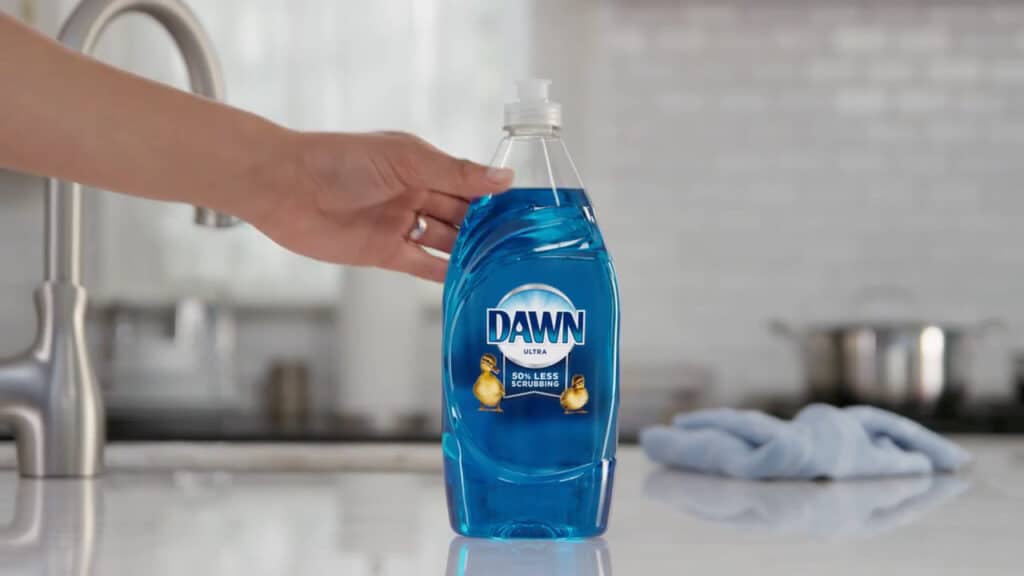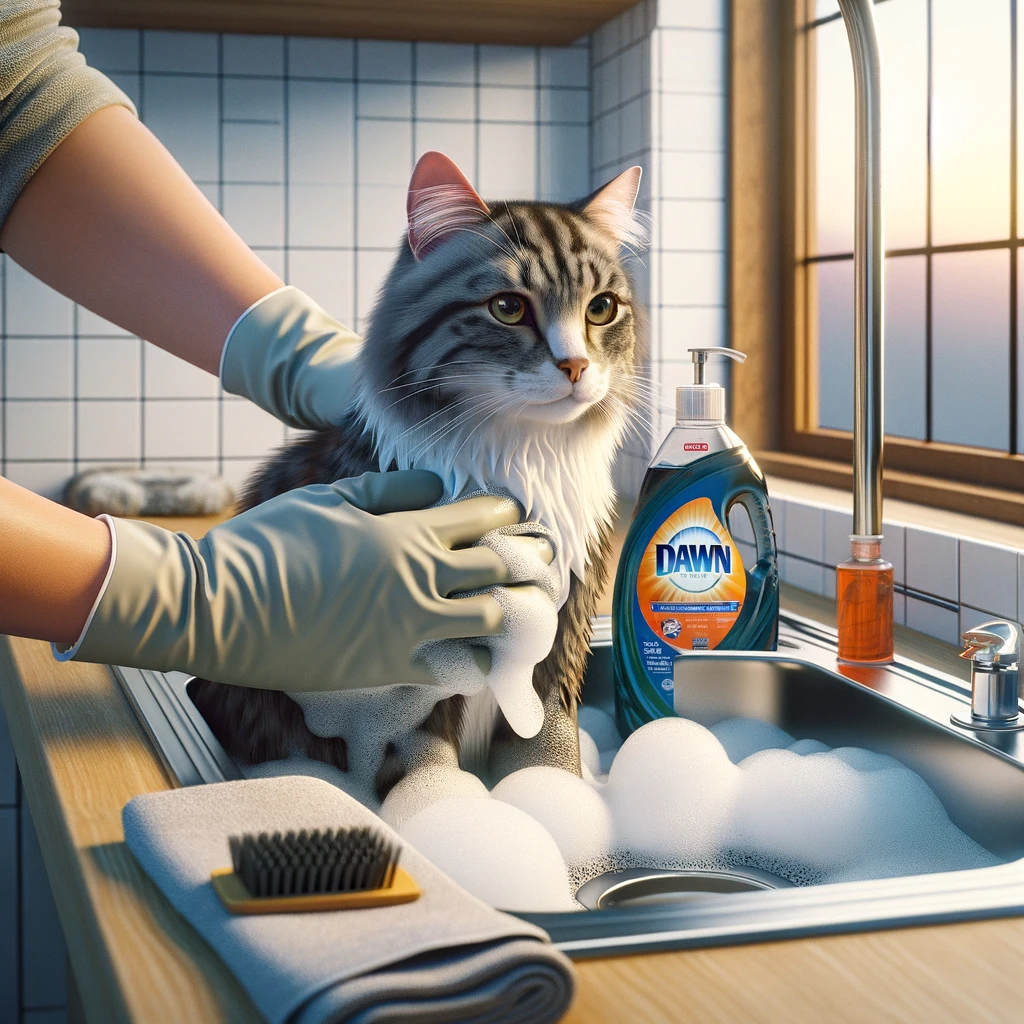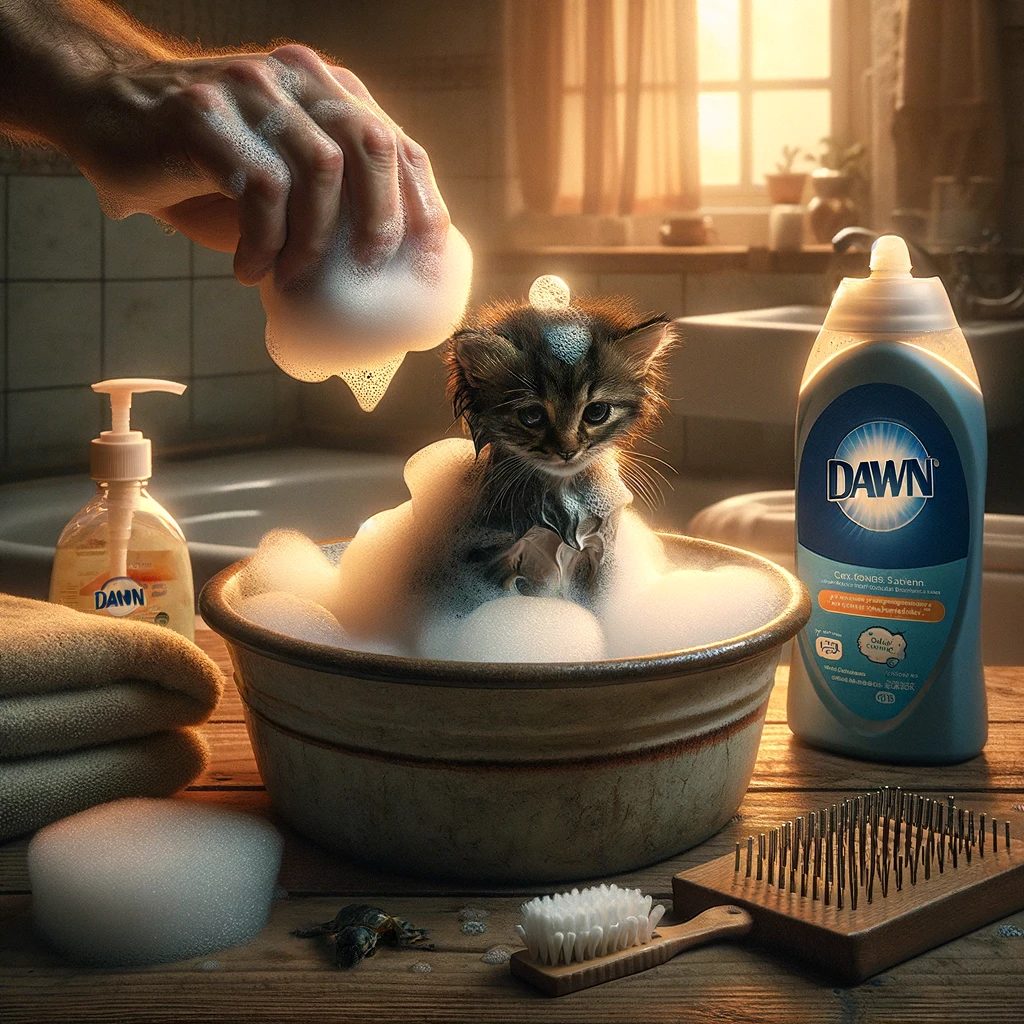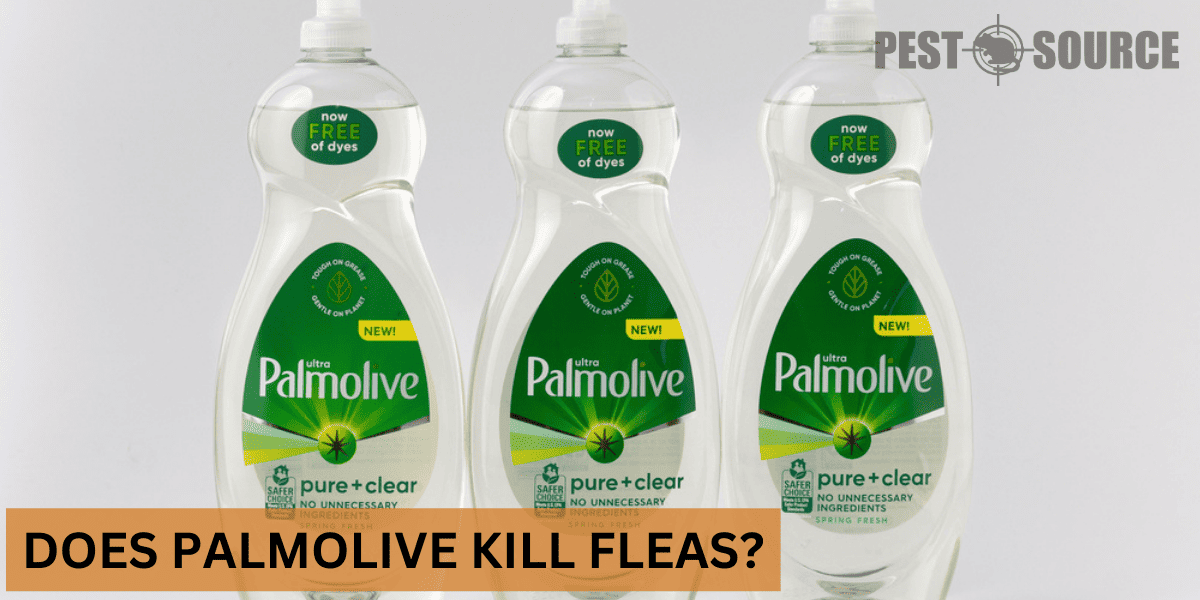Dealing with fleas is a common challenge for pet owners, and finding a quick yet effective solution is always a priority. One household product that has sparked interest for its potential in flea control is dish soap, such as Palmolive.
In this article, we’ll explore whether Palmolive kills fleas and its effectiveness compared to other dish soaps like Dawn and Gain. We’ll also discuss the viability of using dish soap as a flea treatment for dogs and cats while addressing the limitations and potential risks involved. Finally, we’ll touch upon the role of dish soap in a comprehensive flea treatment plan and the importance of consulting with your veterinarian for a long-term solution to keep your beloved pets flea-free and happy.
POINTS
- Dish soaps like Palmolive and Dawn can temporarily kill fleas by breaking the surface tension of water, making it difficult for fleas to stay afloat, and damaging their exoskeleton. However, they are not a long-term solution for flea control.
- Among the different dish soaps, Dawn is considered more effective at killing fleas due to its higher surfactant content compared to Palmolive and Gain.
- Dish soaps can be used on both dogs and cats for temporary flea relief, but they may cause skin irritation, dryness, or other adverse effects. It’s important to use a minimal amount of soap and rinse thoroughly.
- Relying solely on dish soaps is not a long-term solution for flea eradication, as they do not address the underlying causes of flea infestations and do not provide lasting protection against eggs and larvae.
- Dish soap should be used as part of a comprehensive flea treatment plan that includes flea shampoos or sprays, regular flea preventatives, flea combs for maintenance, and environmental control measures to minimize the risk of re-infestation.
The Effectiveness of Dish Soaps in Killing Fleas
How do Palmolive and other dish soaps affect a flea’s exoskeleton?

Dish soaps like Palmolive and Dawn work by breaking the surface tension of water, which in turn affects a flea’s exoskeleton, making it harder for the flea to stay afloat. This leads to drowning as the flea becomes submerged in the soapy water. Additionally, the soap can cause damage to the flea’s exoskeleton, making it more vulnerable to injury and potentially killing the flea.
Can dish soap and water attract and catch fleas?
Dish soap and water can indeed be an effective way to catch fleas, as mentioned earlier. When you mix dish soap with water, it creates a slippery surface that fleas cannot easily escape from. By placing a shallow dish of soapy water near a light source, you can often attract fleas, which then get trapped in the soapy water and drown.
How does Dawn dish soap compare to Palmolive in killing fleas and ticks?

Dawn dish soap is more effective in killing fleas and ticks compared to Palmolive. The reason behind this is the formulation – Dawn dish soap contains more surfactants, which are essential in breaking the surface tension of water and disrupting the flea’s exoskeleton. However, both Palmolive and Dawn can be effective at drowning fleas when used correctly.
Are there differences in effectiveness between different colors or types of Dawn, such as green Dawn?

There is no significant difference in flea-killing effectiveness between different colors or types of Dawn dish soap. The main ingredient that affects fleas is the aforementioned surfactants, which are present in all varieties of Dawn. Some types may have additional ingredients, such as fragrances or moisturizers, but these do not have a significant impact on their ability to kill fleas.
The Use of Dish Soap as Flea Treatment for Dogs
Can you use Palmolive to wash your dog?
Palmolive can be used to wash your dog, but it is not specifically designed for pets and may not be as gentle on their skin as pet shampoo. While it can help remove fleas, it may also cause skin irritation or dryness in some dogs.
Is Palmolive safe for dogs?
Palmolive is generally safe for dogs when used correctly and in moderation. However, it’s essential to rinse thoroughly to remove all the soap residue since this can cause skin irritation or upset your dog’s stomach if ingested. It’s also important to avoid getting soap in your dog’s eyes, as it can cause irritation.
Can you use dish soap on dogs for fleas?
Dish soap can effectively kill fleas on dogs, but it should not be relied upon as a long-term flea prevention solution. While it may provide temporary relief, dish soap does not address the underlying causes of a flea infestation or provide lasting protection for your dog.
How do you give a dog a flea bath with Palmolive or Dawn?

When considering the use of dish soap as a flea treatment for dogs, it’s important to follow a step-by-step guide to ensure the safety and comfort of your pet. Below is a detailed table that outlines the necessary steps for using dish soap like Palmolive or Dawn to treat fleas on dogs, along with precautions to minimize the risk of irritation.
| Step | Description | Precautions |
|---|---|---|
| 1. Preparation | Fill a sink or tub with lukewarm water, enough to cover the dog’s legs. | Ensure the water is not too hot or cold to prevent stress or discomfort. |
| 2. Soap Mixture | Mix a small amount of dish soap into the water to create a soapy solution. | Use a mild dish soap like Palmolive or Dawn to avoid harsh chemicals. |
| 3. Applying Soap | Gradually wet the dog’s fur, avoiding the face, ears, and eyes. Then, gently work the soapy solution into the fur. | Be gentle to avoid causing anxiety, and ensure soap does not enter the dog’s eyes or ears. |
| 4. Washing | Carefully massage the soap into the dog’s fur, reaching all affected areas. | Keep the soap away from the dog’s head to prevent eye and ear irritation. |
| 5. Rinsing | Thoroughly rinse the dog with clean, lukewarm water to remove all soap residue. | A thorough rinse is crucial to prevent skin irritation or ingestion of soap residues. |
| 6. Drying | Gently towel-dry the dog or use a low-heat hairdryer, ensuring the dog is completely dry. | Avoid high heat settings on the hairdryer to prevent skin dryness or burns. |
| 7. Observation | After the bath, observe the dog for any signs of irritation or discomfort. | If irritation occurs, consult your veterinarian for advice on further steps. |
Does Dawn kill fleas and ticks on dogs?
Dawn dish soap is effective in killing fleas on dogs when used as a temporary solution. The surfactants present in Dawn soap help to damage the exoskeleton of fleas, making them more susceptible to injuries and drowning. However, it may not be as effective against ticks, and it should not be considered a long-term solution for flea and tick prevention.
How does Dawn compare to other dog soaps that kill fleas?

Dog soaps and shampoos specifically designed to kill fleas usually contain insecticides or natural ingredients like pyrethrin or essential oils to target fleas more effectively. These products are likely to be more effective in killing and preventing fleas compared to dish soap like Dawn. They may also be gentler on your pet’s skin and coat, reducing the risk of skin irritation or dryness.
Is Dawn toxic to dogs?
Dawn dish soap is generally non-toxic to dogs when used correctly and in moderation. It’s crucial to rinse your dog thoroughly after using Dawn soap to ensure no residue remains, as ingesting soap can cause gastrointestinal upset. Also, be cautious not to get soap in your dog’s eyes to avoid irritation.
The Use of Dish Soap as Flea Treatment for Cats
Can you use Palmolive to wash your cat?
Although Palmolive dish soap can be used to wash your cat in a pinch, it is not specifically formulated for cats’ sensitive skin. Be cautious when using Palmolive on cats, as it may cause skin irritation or dryness. It is preferable to use a cat-friendly shampoo specifically designed for flea treatment.
Is Palmolive safe for cats?
Palmolive is generally safe for cats when used sparingly and rinsed off thoroughly. However, it is not ideal for cats with sensitive skin or long-term flea control. Always be cautious not to get any soap around your cat’s eyes, ears, or nose.
Does Dawn kill fleas on cats?

Dawn dish soap does effectively kill fleas on cats as a temporary solution. It works similarly to how it affects fleas on dogs – by breaking the surface tension of water, making it difficult for fleas to stay afloat. However, this is not a long-term solution for flea control.
How do you give a cat a flea bath with Palmolive or Dawn?

Using dish soap as a flea treatment for cats requires careful consideration and gentle handling, given their sensitive skin and unique grooming habits. Below is a comprehensive table that provides a step-by-step guide to safely using dish soaps like Palmolive or Dawn for flea treatment in cats, including critical precautions to avoid any adverse effects.
| Step | Description | Precautions |
|---|---|---|
| 1. Preparation | Fill a sink or tub with lukewarm water, just enough to cover the cat’s legs. | Ensure the water temperature is comfortable for the cat to prevent stress. |
| 2. Soap Mixture | Mix a small amount of dish soap into the water to create a soapy solution. | Opt for a gentle dish soap to reduce the risk of skin irritation. |
| 3. Applying Soap | Gradually and gently wet the cat’s fur, avoiding the face, ears, and eyes, then apply the soapy solution. | Proceed with care to keep the experience as stress-free as possible for the cat. |
| 4. Washing | Massage the soap gently into the cat’s fur to cover all areas, focusing on flea-infested spots. | Avoid rough handling to prevent scratches and ensure the soap doesn’t get into the cat’s eyes or ears. |
| 5. Rinsing | Rinse the cat thoroughly with clean, lukewarm water to remove all traces of soap. | A thorough rinse is essential to prevent any soap residue, which can cause skin issues or toxicity if ingested during grooming. |
| 6. Drying | Towel-dry the cat gently or allow them to air dry in a warm, draft-free area. | Cats are sensitive to cold, so ensure they are kept warm during the drying process. |
| 7. Observation | Monitor the cat for any signs of skin irritation or discomfort following the bath. | If any adverse reactions occur, consult a veterinarian promptly for guidance. |
Is Dawn dish soap safe to use on kittens for flea treatment?

Dawn dish soap can be used on kittens for temporary flea treatment; however, it should be used cautiously. Use a minimal amount of soap and ensure thorough rinsing to avoid any soap residue. It is essential to consult with your veterinarian about using dish soap on a young kitten, as there may be other, safer alternatives for flea treatment.
Can I wash my cat with dish soap to kill fleas?
It is possible to wash your cat with dish soap like Palmolive or Dawn to kill fleas temporarily. However, be aware that dish soap is not specifically formulated for cats, and using it could lead to skin irritation or other adverse effects. It’s better to opt for a cat-specific flea shampoo or consult your veterinarian for a safe and effective flea treatment.
Comparing Dish Soaps: Palmolive, Dawn, and Gain
When it comes to using dish soap as a flea treatment for pets, not all brands are created equal. The table below compares the key features of Palmolive, Dawn, and Gain, focusing on their effectiveness in flea control, potential for skin irritation, and any unique benefits or drawbacks, providing pet owners with essential information to make an informed choice.
| Feature | Palmolive | Dawn | Gain |
|---|---|---|---|
| Effectiveness in Flea Control | Moderate | High | Moderate |
| Surfactant Content | Lower than Dawn | Highest | Similar to Palmolive |
| Potential for Skin Irritation | Moderate | Low-Moderate | Moderate |
| Specific Benefits | – Mild formulation suitable for less severe infestations – More suitable for sensitive pets | – High surfactant content makes it very effective against fleas – Relatively gentle on pet skin | – Effective in mild cases of flea infestations – Pleasant scent |
| Drawbacks | – Less effective against severe flea infestations compared to Dawn | – May require careful rinsing to avoid residue | – Similar to Palmolive in effectiveness and potential for skin irritation |
How do Palmolive, Dawn, and Gain dish soaps compare in killing fleas?
In general, Dawn dish soap is often considered the most effective at killing fleas, primarily due to its higher surfactant content compared to Palmolive and Gain. While all three dish soaps can be used to kill fleas in a pinch, Dawn has a better track record for successfully eliminating fleas.
Are there specific benefits or drawbacks to each brand?
Dawn’s primary advantage is its effectiveness in killing fleas, making it the popular choice among pet owners for a temporary fix. However, it’s important to remember that dish soaps, including Dawn, are not specifically designed for pets. These soaps may cause skin irritation or dryness in some animals.
Palmolive and Gain, while less effective at killing fleas, still have the potential to help remove fleas from your pet’s fur when used with water. However, similar to Dawn, they may also cause skin irritation or dryness.
It’s crucial to remember that none of these dish soaps should be considered a long-term solution for flea control. To maintain flea-free pets, consult your veterinarian for appropriate flea prevention methods and products.
Understanding the Limitations and Risks of Dish Soaps for Flea Treatment
Why aren’t dish soaps considered long-term options for flea eradication?
Dish soaps like Palmolive, Dawn, and Gain are not considered long-term options for flea eradication because they do not address the underlying causes of flea infestations. Although dish soaps can kill some fleas on your pet, they do not provide lasting protection or the essential ingredients that target and prevent flea eggs and larvae. Additionally, dish soaps are not formulated for pets, and frequent use can lead to skin irritation or dryness.
What are potential risks of using dish soaps on pets?
While dish soaps like Palmolive, Dawn, and Gain can offer a temporary solution for flea control on pets, it’s crucial to understand their limitations and potential risks. Below are key points highlighting why dish soaps should not be considered long-term flea treatment options and the risks involved in their use.
- Not a Long-term Solution: Dish soaps do not address the underlying causes of flea infestations, such as flea eggs and larvae, making them ineffective as a long-term solution.
- Risk of Skin Irritation and Dryness: Frequent use of dish soaps on pets can lead to skin irritation or dryness due to their formulation not being specifically designed for pet skin.
- Potential for Gastrointestinal Upset: If pets ingest soap residue, either by licking their fur or from soap not thoroughly rinsed off, it can lead to gastrointestinal upset.
- Eye Irritation: Accidental soap entry into the pet’s eyes during washing can cause significant irritation and discomfort.
- Essential Ingredients Missing: Unlike pet-specific flea treatments, dish soaps lack essential ingredients that target and prevent flea eggs and larvae, reducing their effectiveness in comprehensive flea management.
- Importance of Comprehensive Flea Control: Relying solely on dish soap for flea treatment overlooks the necessity of a comprehensive approach, including regular use of flea preventatives, environmental cleaning, and professional veterinary advice.
- Variability in Effectiveness: The effectiveness of dish soap in killing fleas can vary based on the soap’s formulation and the flea infestation level, leading to inconsistent results.
- Drying Effect on Pet’s Coat: Regular use of dish soaps can strip natural oils from your pet’s coat, leading to a dull coat and potential for increased skin irritation.
Understanding these limitations and risks is vital for pet owners considering dish soap as a flea treatment method, emphasizing the importance of consulting with a veterinarian for more effective and safer alternatives.
Conclusion: The Role of Dish Soap in a Comprehensive Flea Treatment Plan
While dish soap, such as Palmolive, Dawn, or Gain, can play a role in temporarily killing fleas on your pet, it should not be relied upon as a sole method of flea control. Dish soap should only be used as part of a comprehensive flea treatment plan, which could include:
- Flea shampoos or sprays: These products, specifically designed for pets, can effectively kill and prevent fleas without causing harm to your pet’s skin and fur.
- Flea preventatives: Consult with your veterinarian about oral or topical flea preventatives that can be used regularly to protect your pet from fleas.
- Flea combs: Regularly using a flea comb on your pet can help remove fleas and monitor your pet’s flea situation.
- Environmental control: Regularly clean your home, including vacuuming carpets, washing pet bedding, and treating your yard for fleas to minimize the risk of re-infestation.
In summary, dish soap can be a helpful aid in temporarily killing fleas on your pet, but it should not be relied upon as a long-term solution. Consult your veterinarian for suitable flea treatment options, and always prioritize your pet’s health and comfort in your chosen flea control methods.



